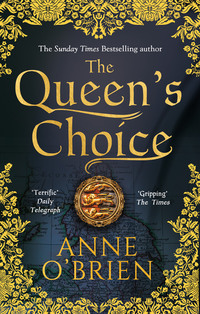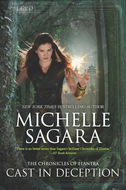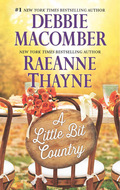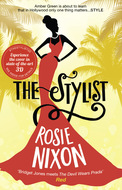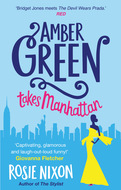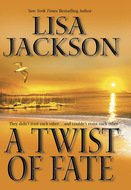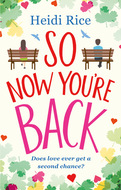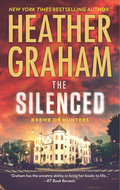Raamatut ei saa failina alla laadida, kuid seda saab lugeda meie rakenduses või veebis.
Loe raamatut: «The Queen's Choice»



ISBN: 978-1-474-03253-7
THE QUEEN’S CHOICE
© 2016 Anne O’Brien
Published in Great Britain 2016
by HQ, an imprint of HarperCollinsPublishers Ltd 1 London Bridge Street, London, SE1 9GF
All rights reserved including the right of reproduction in whole or in part in any form. This edition is published by arrangement with Harlequin Books S.A.
This is a work of fiction. Names, characters, places, locations and incidents are purely fictional and bear no relationship to any real life individuals, living or dead, or to any actual places, business establishments, locations, events or incidents. Any resemblance is entirely coincidental.
By payment of the required fees, you are granted the non-exclusive, non-transferable right and licence to download and install this e-book on your personal computer, tablet computer, smart phone or other electronic reading device only (each a “Licensed Device”) and to access, display and read the text of this e-book on-screen on your Licensed Device. Except to the extent any of these acts shall be permitted pursuant to any mandatory provision of applicable law but no further, no part of this e-book or its text or images may be reproduced, transmitted, distributed, translated, converted or adapted for use on another file format, communicated to the public, downloaded, decompiled, reverse engineered, or stored in or introduced into any information storage and retrieval system, in any form or by any means, whether electronic or mechanical, now known or hereinafter invented, without the express written permission of publisher.
Version: 2019-04-12
Acclaim for the author ANNE O’BRIEN
‘The author a compulsive storyteller.’
–Sunday Express
‘If you enjoy Philippa Gregory and Alison Weir,
you will love Anne O’Brien.’
–We Love This Book
‘This book has everything – royalty, scandal, fascinating
historical politics and ultimately, the shaping
of the woman who founded the Tudors.’
–Cosmopolitan
‘One of the best writers around.’
–The Sun
‘Flawlessly written.’
–Birmingham Post
‘Another excellent read from Anne O’Brien.’
–The Bookbag
‘One of Britain’s most popular and talented writers
of medieval novels.’
–Lancashire Evening Post
‘A must-read for any historical fiction fan.’
–The Examiner
‘Her writing is highly evocative of the time period…
O’Brien had produced an epic tale.’
–Historical Novel Society
‘Anne O’Brien’s novels give a voice to
the “silent” women of history.’
–Yorkshire Post
‘Brings the origins of the most famous royal
dynasty to vibrant life.’
–Candis
‘I was keen to see if this book… lived up to
the hype—which it did.’
–Woman



To George, as always with my love, and thanks for
allowing me to fill the house with music and songs
of courtly love from the medieval troubadours.
As Joanna might have sung to Henry:
‘To you, sweet good-natured one, have I give my heart. Never shall it be taken from you.’
Jehan de Lescurel d.13o4
Who ever lov’d, that lov’d not at first sight?
Christopher Marlowe 1564-1593: Hero and Leander
Forasmuch as I am eager to hear of your good estate…I pray you, my most dear and most honoured lord and cousin, that you would tell me often of the certainty of it, for the great comfort and gladness of my heart. For whenever I am able to hear a good account of you, my heart rejoices exceedingly.
Written at Vannes 15th February 1400: the duchess of Brittany to King Henry IV
(The wives of powerful noblemen) must be highly knowledgeable about government, and wise…
Christine de Pizan: The Book of the City of Ladies c. 1405
Thou shalt not suffer a witch to live.
Exodus 22.18
Contents
Cover
Title Page
Copyright Page
Acclaim for the Author ANNE O’BRIEN
Dedication
Chapter 1
Chapter 2
Chapter 3
Chapter 4
Chapter 5
Chapter 6
Chapter 7
Chapter 8
Chapter 9
Chapter 10
Chapter 11
Chapter 12
Chapter 13
Chapter 14
Chapter 15
Chapter 16
Chapter 17
Chapter 18
Chapter 19
Epilogue
Also by Anne O'Brien
Extract
ACKNOWLEDGEMENTS
WHAT INSPIRED ME TO WRITE ABOUT JOANNA OF NAVARRE?
AND AFTERWARDS
IN THE FOOTSTEPS OF JOANNA OF NAVARRE
QUESTIONS FOR READING GROUPS
About the Author
About the Publisher
Chapter 1
October 1396: the town of Ardres, near Calais
It was to be the day, although I did not know it when my women confined my hair to a jewelled caul and coronet, my feet to gilded-toed shoes, and all in between to layers of fine linen, silk damask and fur.
It was to be the day that my life tilted on its even keel; the day that my ordered existence warped, as a tapestry, ill-formed in the hands of a careless Arras weaver, would stretch immoderately in the damp of winter. I had one such in my audience chamber at the Château of Vannes, until I dispatched it, ruined, to some distant storeroom. On this day it was as if some power had disturbed an exact balance that throughout my life had been secure and unquestioned.
It was the day that I met Henry, Earl of Derby.
Not that I had any presentiment of such meddling in what fate, my father and my husband had decreed for me. Nor did I look for such turbulence in my life, for I lived in placid luxury, always predictable, sometimes dull, but never less than harmonious. My life demanded no emotional response from me, rather a practical acceptance of my role as wife, mother, ducal consort. Indeed my whole life had been one of acceptance. I was particularly good at it. I was nobly born, twenty-eight years old, and had been Duchess of Brittany for ten of them. But on that bright morning, my thoughts occupied far from any intrusive dabbling, all was overset.
‘What do you think?’
A soft voice in my ear managed to pierce the snap and flap of canvas of the dozens of pavilions, a huge encampment constructed for the occasion. The voice of John de Montfort, my husband, the fifth Duke of Brittany.
‘Poor mite. It’s no age to be wed,’ I whispered back. I would not wish for one of my daughters to be wed at so tender an age, but dynastic marriages demanded sacrifice. My mother, undoubtedly a sacrifice in her union with my father, had been wed at eight years.
‘He’ll only get her allegiance.’ John frowned at the charming scene where the bridegroom kissed the cheek of his child-bride. ‘Not her body.’
‘So I should hope.’
I smiled.
I liked weddings. Such an opportunity to reunite with family and friends, and erstwhile enemies too, without the prospect of drawn swords or blows traded in the aftermath of too many toasts to the happy couple. Although, I considered as the two puissant kings, one of England, the other of France, drew close to exchange the desired kiss of peace, that could not always be guaranteed. I remembered occasions when good manners had drowned in a pot of ale almost before the marriage vows had been taken.
But not today. Today, we had been assured, would be a day of good omen. We all knelt in a gleaming shiver of silk and satin as Richard of England and Charles of France clasped hands and beamed their goodwill.
I particularly like French weddings, with the wealth of aunts and uncles and a fistful of cousins here for me to enjoy, for through my mother’s blood I was a Valois princess. And now that the greatest blot on the political landscape, my father, no longer defiled this earth with his presence, there was no need for me to hold my breath as I had as a young girl. My father was dead, and had been for almost ten years. He and his vile temper and even viler habits would not be missed.
My father, of atrocious repute, had been King of Navarre, that prestigious little kingdom which bordered with France and English possessions to the south, and so was much desired in alliance. But it was my mother, daughter of the Valois King John the Good, who gave me my true rank. King Charles the Sixth of France was my first cousin, the Dukes of Berry and Burgundy my uncles. I could claim cousinship with every man or woman at the Valois Court of France. Every man or woman who mattered in the politics of Europe. I had been raised to know my worth.
‘I see that Charles is in his right mind,’ I observed, my eyes lowered in deepest respect for this royal cousin who was acknowledged as mad and could become violent in the blink of an eye. ‘I expect the whole Court has been offering up novenas to St Jude.’
‘Ha! It would take more than a petition to lost causes. I wager it would take a full Requiem Mass to guarantee Charles’s sanity for more than a day at a time,’ my husband replied.
We were here for a momentous alliance that might bring some vestige of peace to our troubled lands. And there he was, the bridegroom, tall and resplendent in red, smiling and gracious, luminous with satisfaction. We had heard that it was not altogether a popular move across the sea, a French woman to be crowned Queen of England, but the English King would have his way. King Richard the Second, a widower, was in need of a wife and an heir. A country was precarious without heirs, and here I could admit to my own smugness. I came from fertile stock, with six stalwart children of my own, four of them sons to safeguard the inheritance of Brittany. I had every reason to enjoy my own achievements. Was family not everything?
We rose to our feet, my husband’s hand beneath my arm, allowing me the time to cast an eye over the bride, this child Isabelle who was still four weeks from her seventh birthday. I did not fear for her. She would be given all the time she needed to grow up before she must become a wife.
‘He will care for her.’
I turned to the owner of the voice who had echoed my thoughts, John, solid in dark velvet, as handily at ease in silk and fur and jewelled rings as he was in armour. My lord was given to opulence when the occasion demanded it.
‘He looks at her as if she were a present wrapped in gold,’ I said. The bride giggled as Richard bent again to kiss her cheek. ‘Do you think it will bring an end to the conflict?’
‘King Richard does not have a name for warfare,’ John said, and in truth the rancorous relations between England and France had settled a little since Richard had taken the throne. ‘He’s not of a mind to pursue English claims in France, lost by Edward, the old King.’
And there the discussion of rights and wrongs, of who should wear the Crown of France ended, as the royal families moved towards the dais. The crowds milled. The musicians and minstrels puffed and blew with enthusiastic disharmony. Platters of food and vessels of wine were produced. I sighed a little.
‘Do you wish to go? I can arrange for you to retire.’
John’s hand was again solicitously on my arm, for I was carrying another child. No one would notice—there was no need yet for my sempstresses to loosen the stitching of my bodice—but John had a protective care for me and I covered his hand with mine.
‘Certainly not.’
John, wisely, did not waste his breath in argument. ‘Then if you are feeling robust, my love, come and meet a family for whom I have the greatest affection.’
John set about forcing a path, the bejewelled crowd parting before his impressive figure like the Red Sea before Moses. We were heading, I realised, towards the English contingent that had accompanied their King, now standing in an elegant little group to one side of the dais. Superbly dressed, superbly self-aware as they viewed the proceedings, they were here to honour the event and be gracious. I did not know them.
‘John of Lancaster. The King’s uncle.’ My husband, coming to my rescue, shepherded me between two gesticulating parties, Burgundian by their accent. ‘An interesting family and a powerful one. They make good friends and bad enemies. They’re not without a little pride and their blood is more royal than most.’ He looked back at me over his shoulder with a speculative gleam. ‘Much like you. I think you will like them.’
Which allowed me in the few seconds left to me to claw through my knowledge of this illustrious grouping. For this was an important family: a family of the highest rank, a family worthy of my own status. Duke John of Lancaster, royal uncle to the King of England. His new wife Katherine, a woman of some scandals before marriage made her respectable. And with them a cluster of young men and women of their family and household, wearing conspicuous livery collars that bore the emblem of the white hart, the showiness of the enamelled gold at odds with the understated costliness of their robes. Clearly a gift from King Richard on this momentous day that they were unable to refuse.
Lancaster’s face lit with pleasure when his eye fell on my husband, and rather than a formal handclasp, they embraced, two men who wielded power with utmost confidence in their right to do so, two men of an age although it seemed to me that my husband was carrying his years more easily than Lancaster. There was no reticence in the welcome.
‘I hoped I would see you,’ Lancaster said after some male shoulder-smacking.
‘My wife would not allow me to stay away,’ John replied, drawing me forward.
The introductions were made and I was drawn into the Lancaster circle, to talk with Duchess Katherine while Lancaster and my husband relived their youth, their boyhood rivalry and their military exploits when fighting together in France.
‘I first recall your husband at Court when King Edward made him a Knight of the Garter,’ the Duchess said. ‘He enjoyed every minute of the pomp and pageantry.’
‘Now, why am I not surprised?’
I turned my head to watch him with a certain pride, admiring his present flamboyance in managing the folds of a Court houppelande that swept the floor with hem and dagged sleeve. Many, who did not know us, would think him to be my father. There were twenty-eight years between us, all well lived by John through war and diplomacy.
‘We are being summoned,’ the Duchess remarked as Richard raised an imperious hand. ‘We are to formally meet the bride.’ And as the Lancaster family regrouped and approached the dais with suitable obeisance, I was left with John to watch the little ceremony develop.
‘They were the strongest friends I ever had in England,’he said,‘when I was sorely in need of friends. I wonder where Lancaster’s son is…?’ As he turned his head, a man garbed in blue and white emerged from the crowd. ‘Ah. There you are. I thought you’d made a bolt for it,’ John observed with friendly cynicism.
‘You’re not far short of it. The temptation is strong. But, as you see, I am royally imprinted for the occasion, making me noticeable in any crowd.’
The voice was light-timbred, pleasant on the ear, with a hint of humour beneath an impatience as he slapped his palm onto the arresting white hart on his breast. Then as he clasped hands with John, the man’s gaze rested on me. ‘And this must be your incomparable Duchess, of whom I have heard much but whom I have yet to meet. I am honoured.’
A tall man with a swordsman’s shoulders and the mark of his father in his dark hair, uncovered now, kissed with autumn in the bright sunshine. His eyes were dark, direct and agate-bright.
I began to smile my appreciation of his flattery as I felt the weight of that gaze. I felt the authority of his soldierly presence. I felt a sense of him deep within me, a sense that continued to reverberate like the solemn tone of the passing bell in the Cathedral at Nantes. Unaccountably, for I was not inexperienced in the demands of polite conversation, I was at a loss for a response.
‘This is Joanna,’ John was saying whilst I grasped at good manners. ‘Who rules my household with a rod of iron but a velvet glove and sleeve. Don’t be fooled for one minute by this frivolity.’ He lifted the gold-stitched fullness of one of my over-sleeves in wry acknowledgement. ‘And this, my love, is Henry Bolingbroke, Earl of Derby. Lancaster’s heir.’
I extended my hand as if this introduction was nothing more than a commonplace between members of one highbred family and another, as I ignored the fact that my heart had given a little leap, as if it had recognised the imminence of something long yearned for. This was so far beyond my experience that I resented it. No man, however puissant his family, had the right to disturb me beyond my habitual poise.
‘My lord Henry,’ I murmured.
‘Lady Joanna.’
His fingers, heavy with rings, were light around mine, the salute against my cheek such as might be exchanged between a man and woman meeting for the first time, but that formal embrace stiffened the planes of my face, seizing my pulses to set them alive. And as I sought for some comment suitable to the occasion, John’s attention was claimed by my uncle of Burgundy, leaving me to take up the reins of prudent conversation.
I inhaled steadily, confidence restored. I had been conversing through the courts of Europe since before I had reached my twentieth year. Any strange imaginings were a product of the heat of the day, the weight of the fur at hem and neck and insufficient sleep in the closet that was called a chamber. I smiled with regal grace as the Earl restored my hand to me.
‘My husband was pleased to meet with your father again,’ I said.
But instead of responding in kind, he asked abruptly,‘Are you enjoying this?’ He gestured with his arm to the royal party, as if it were a question that needed to be asked.
‘Yes. Certainly I am.’ It could be tedious with much posturing, certainly overlong, but what was there not to like?
‘I can’t imagine why.’ The Earl’s reply could have been presumed sour.
‘Because I have enough relatives here to fill, and indeed overflow, one of these vulgarly glittering pavilions,’ I said. ‘I enjoy gossip.’
‘You’ll not be disappointed then. There’s plenty to gossip about.’ A frown was directed towards his royal cousin who was still addressing King Charles with expansive animation. ‘They say it has cost our illustrious King not far short of two hundred thousand pounds to stage this spectacle.’
I could not understand why the cost should trouble him. Given the quality of his raiment, a Court houppelande brilliant with spangles, sweeping down to his soft boots, and the size of the jewels in his rings, the House of Lancaster was not without wealth.
‘Is the bride not worth the expenditure?’ I asked.
‘Is any bride worth it?’ Earl Henry responded smartly. ‘The English Exchequer will barely stand the cost. Besides, it’s not the bride Richard seeks to honour. He’ll make such a spectacle that no one will ever forget His Gracious Majesty King Richard the Second, condescending to take a French bride. No one is ever at the forefront of Richard’s mind except Richard.’
No one could mistake the sardonic overtones, and not spoken softly. I thought it not wise, given the company, and risked a glance over my shoulder to guard against eavesdroppers. A quick movement that Earl Henry noted, with a frown, as if I had accused him of a wilful indiscretion. Which, of course, it was.
‘There’s no one to hear, or I wouldn’t have said it.’
‘There’s me.’ His observation had amused me. Shocked me.
A glimmer of a smile lightened the severe features, smoothing the indented corners of his mouth. ‘You will think me too harsh. But you seem to me a woman of great common sense. Extravagance is a sin when a state lacks gold in its coffers. Do you not agree?’
‘Certainly. As we know in Brittany.’ I paused, then because we seemed to have dived headlong into a stream of personal comment:‘But you are very judgemental, sir, against a man who is not only your King but also your cousin.’
‘Forgive me.’ He grimaced slightly, before allowing another more expansive smile. ‘This is supposed to be a day of celebration. There’s no reason to inflict my particular brand of disillusion on you, Madam Joanna. Will you forgive what must seem to you to be a nasty case of envy?’
‘Yes.’
I said it without hesitation.
‘Well that’s got the introductions over with. What—or should I say whom, since you have a mind for gossip—shall we discuss now?’
I liked him. I liked his candour. As I allowed myself to acknowledge this, we found our attention once more drawn towards the royal tableau on the dais.
‘Shouldn’t you be with your family?’ I asked.
‘Richard won’t miss me.’ There again, the edge had crept back into his voice; the cynicism darkening his eye. ‘Look at him, wringing every drop of glamour from this alliance. That’s not to say that he will not do well by his bride. He will dress her in silk, laden her with jewels and treat her as she treats her dolls. She will be his little sister.’ His mouth twisted. ‘Perhaps he’ll not allow her to keep all the jewels in her dowry. He’ll wear most of them himself. Richard likes to glitter when in company.’
The bride had a collar of rubies that almost out-weighed her.
Aware of the sudden silence beside me, I turned to look, to see that Earl Henry was regarding the King of England, and in the muscles of his jaw and the brilliance of his eye, I thought I read not so much displeasure at Richard’s unwise open-handedness but a very personal dislike.
‘You don’t like him, do you?’ I said before I could think of the wisdom of such an observation.
‘Liking is too facile an emotion for my relationship with Richard. He is my King and my cousin. I am duty-bound to be loyal.’ My companion’s spine stiffened a little, words and expression immediately shuttered like a storm candle, obscuring the light. And I was sorry. I liked his honesty rather than the discreet presence bred in him by his father. I liked his smile, rather than the present grim demeanour. Perhaps I could entice him back into this intriguing view of the English King.
‘You can admit to not liking him,’ I said softly. ‘Certainly in my company. I didn’t like my father at all.’
Earl Henry’s eyes gleamed with appreciation until suave diplomacy once more invested his features. ‘I dare to surmise, Madam, that no one liked your august father.’
‘It would be beyond the powers of any normal human to view my father with anything but disgust. My father was accused of every sin from poisoning to sorcery with a deal of blood-letting in between. And I expect he was guilty of all of it.’ What point in being circumspect? ‘Hence Charles the Bad. Charles the very Bad!’And when my companion’s brows arched expressively, I continued:‘I say only what everyone here knows. There was much rejoicing at his death even if not for the manner of it, although many expressed the opinion that it was a well-deserved foretaste of the fires of Hell.’ My father had been consumed in a conflagration in his bed when the bandages he wore, soaked in brandy against some sweating disease, had been set alight by a careless servant with a candle. ‘Why don’t you like your cousin?’
Earl Henry slid a speculative glance but his response was smooth and I felt that he was restoring us to the realms of polite discourse. ‘A mere memory of youthful frictions. Richard and I were raised together, and not always amicably, I suppose because our tastes and interests are vastly different. Richard is the most inept wielder of a sword that I know. There you are. Nothing more and nothing less than childhood conflicts. You might say that I should have grown beyond such trivial grievances.’
‘I would not be so indiscreet as to say any such thing, sir.’
I did not believe him. There was a stern brooding involved here, but our acquaintance was so transient that I must allow his diversion, however much I might like to discover more.
‘No. I don’t suppose you would,’ he replied, lightly now. ‘Not only a lady of common sense but one of great discernment, I think. And of considerable presence. Duke John is a fortunate man to have a wife who is as handsome in character as she is in person.’
I wondered if he was guilty of a soft mockery at my expense, for I had never been considered a great beauty, even when touched with the kind hand of youth, and so I challenged him, my brows a little raised, but he met my provocation directly and held it. Once again I experienced that uncomfortable little jump of my heartbeat; a warmth spreading beneath my bodice as if a flame had been lit.
And I was intrigued. There was no mockery in his steady regard. Instead there was a curious arrest, almost a bafflement as if some unexpected emotion had intruded on our innocuous exchange of opinion. Even the air felt heavy with portent. His lips parted as if he would express what was occupying his thoughts.
Then it was gone, the moment broken, the tension that held us falling away, so that the air settled quietly around us again, as my husband, abandoned by Burgundy, rested a hand on Earl Henry’s shoulder, and I was left to wonder if I had imagined the whole episode as John observed: ‘You were a child when I saw you last. And here you are, Earl of Derby, with a reputation as an expert jouster.’ His eye twinkled. ‘How old were you? Ten?’
‘About that. And I remember, sir.’ Earl Henry was at ease again, and whatever he had been about to say was lost for ever. ‘You gave me a hunting knife when we rode out at Windsor and I had lost mine. I still have your gift. It has a fine engraved blade. If I recall, I didn’t let it out of my sight for months.’
John laughed. ‘You’ll do your father proud. It’s good to have an heir. Richard will have a long time to wait for his bride to grow up and bear him a son.’
Once again we inspected the group on the dais where Richard spoke gravely to King Charles, who looked mildly interested, and Isabelle threaded her fingers through the gems on her girdle.
‘Do you stay for the whole of the celebrations?’ Earl Henry asked.
‘Unfortunately, yes. My wife will not allow it to be otherwise.’
With promises to meet again, we prepared to follow the royal party, Earl Henry saluting my fingers with a chivalric grace worthy of the most famous of troubadours.
‘Thank you for your discretion, my lady.’
‘It is my pleasure, my lord.’
‘And what was that about?’ John asked as Earl Henry threaded his way to his father’s side.
‘I have promised to keep secret the fact that Earl Henry detests his royal cousin,’ I replied, following his progress, struck again by the unconscious grace.
‘I expect King Richard knows it full well,’ John growled. ‘We’ll do well to keep out of English politics, for our own health. And particularly out of the sphere of that young man. As your uncle of Burgundy was kind enough to advise, although why he should think that I cannot judge the matter for myself I have no idea. Who knows more about treachery than I? Burgundy says to steer clear.’
‘Did he?’ I was surprised.
‘He considers the Earl of Derby to be a dangerous fire-brand. There is already the taint of treason about him. He raised arms against Richard ten years ago.’ John eased his shoulders beneath the weight of bullion. ‘I see no danger but we will keep our friendship warm but appropriately circumspect.’
It was a warning but softly given and not one I needed. I had no intention of becoming involved. As for Henry, Earl of Derby, ours was a mere passing acquaintance. A friendship. An opportunity to give open and honest exchange of opinion, where neither of us needed to be circumspect. That was trust. Was that not the essence of friendship?
But then I recalled that first brilliant moment of awareness. Something, some close link, like those in the Earl’s glittering livery chain, had scattered my thoughts like the stars in the heavens, nudging into life a longing I could not recognise. It disquieted me, unnerved me. How could it be that I could trust a man within a handful of minutes of my setting eyes on him? I was certainly not given to immoderate confidences.
And he stayed in my mind as I retired to our cramped chamber to rest my ankles that, in these early days of my pregnancy, had a tendency to swell in the heat. With soothing cloths soaked in a tincture of red wine and cinquefoil, my hair loosed from its confines, I lay back against the pillows and had no difficulty at all in summoning the Lancaster heir into my presence. The fan of lines at the corner of his eyes that had smiled so readily, when not shadowed and sombre. The flare of passion when he had admitted his dislike of his King, even if one born out of childhood antipathy. The austere nose, a mark of all the Lancasters, that spoke of command. The agile carriage, albeit swathed in fragile cloth, of a man of action. Instinctively I knew that the extravagantly ringed hands could wield a sword and manage reins with force and skill. And as for the pride, it infiltrated his every movement, every turn of his head. He too knew his own value as a scion of the Plantagenets, raised into it by a powerful father, the most influential of the sons of old King Edward.
‘This is inappropriate, for a married women who is content with her situation,’ I announced aloud, dismayed by the detail of my recollection. ‘And one who is carrying a child. He is nothing to you.’
